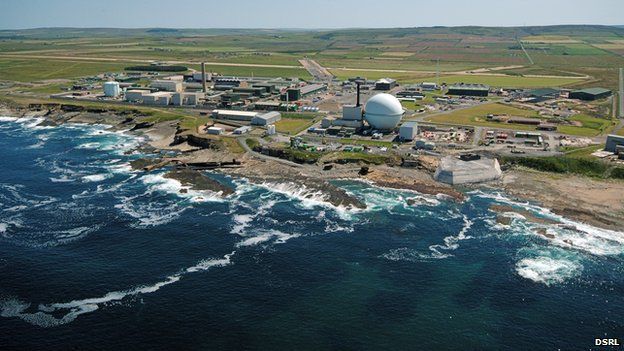Fire at Dounreay led to release of radioactivity
- Published

A fire in part of Dounreay's Prototype Fast Reactor (PFR) facility last month led to an "unauthorised release" of radioactivity into the environment.
Dounreay Site Restoration Limited (DSRL) said "procedural non-compliances and behavioural practices" by staff led to the incident on 7 October.
DSRL said trace amounts of tritium were released and did not pose a risk to the public.
No-one at the plant was hurt in the early morning incident.
The Caithness site's fire brigade extinguished the blaze in the PFR's sodium tank farm within 30 minutes.
Managing director Mark Rouse said DSRL has been served with an improvement notice by the nuclear industry's regulators.
He said: "Our investigation identified unacceptable behaviours and practices that fell well short of our values and standards.
"It is important to take the time to ensure as many lessons are learned from this incident as possible.
"We are determined to improve our behaviours and compliance to ensure that we always meet the high standards expected on a nuclear site."
What is tritium?
Tritium is a radioactive isotope of the element hydrogen.
It is produced naturally in the Earth's upper atmosphere, but is also produced by nuclear weapons explosions and commercially in civilian reactors.
According to the US Environmental Protection Agency, tritium is used to illuminate exit signs in buildings, aircraft gauges and dials on wristwatches.
The Scottish Environment Protect Agency allows DSRL to discharge specified amounts of a gaseous waste called krypton-85 into the atmosphere.
Kr-85 is found in some types of light bulbs.
Levels of the gas increased in 2012 compared to 2011 due to work to decommission Dounreay's fast reactor and prototype fast reactor.
Since then, radioactivity in the environment around Dounreay has been found in low and ever decreasing concentrations, according DSRL.
The reactor ceased operating in 1994 and is more than halfway through a process of being decommissioned.
More than 1,500 tonnes of sodium, a material used when the reactor was in operation, has been safely destroyed so far.
The fire occurred in a building where tanks are used to store sodium.
The incident happened on the same day a blaze broke out on a ship transporting radioactive waste from Dounreay to Belgium.
The blaze started in one of the MV Parida's two funnels on the night of 7 October.
It lost power and started drifting towards an oil platform in the Moray Firth. Fifty-two people on the rig were evacuated as a precaution.
Following repairs the ship was able to resume its journey.
'Extremely concerning'
WWF Scotland has raised concerns about the release of radioactivity during the fire at Dounreay
Director Lang Banks said: "Thankfully no-one was injured in this incident. However, that the fire resulted in the release of radioactive material is deeply worrying and calls into question the processes currently in place to protect people and the environment.
"There needs to be a thorough review of procedures to ensure noting like this can ever happen again.
"This incident again highlights the hazardous and expensive problem of dealing with the radioactive legacy of the nuclear industry."
Environment Secretary Richard Lochhead said the Scottish government viewed the matter as "extremely concerning" and expected industry regulators to closely monitor work at Dounreay.
He said: "It has been identified that procedural non-compliances and behavioural practices were factors in the fire incident last month.
"This is simply unacceptable and must end immediately."
Mr Lochhead added: "Scottish government officials will be meeting with Dounreay senior management shortly to discuss the issue and find out what measures they are putting in place to address regulators' concerns."
- Published8 October 2014
- Published24 June 2014
- Published9 May 2014
- Published19 November 2013
- Published20 August 2012
- Published20 August 2012
- Published6 July 2012